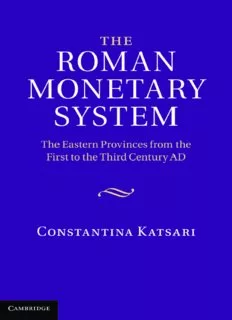Table Of ContentTHE ROMAN MONETARY SYSTEM
The Roman monetary system was highly complex. It involved offi-
cialRomancoinsinbothsilverandbronze–whichsomeprovinces
producedwhileothersimportedthemfrommintsinRomeandelse-
where – as well as, in the east, a range of civic coinages. This is a
comprehensive study of the workings of the system in the Eastern
provincesfromtheAugustanperiodtothethirdcenturyAD,when
the Roman empire suffered a monetary and economic crisis. The
Eastern provinces exemplify the full complexity of the system, but
comparisonsaremadewithevidencefromtheWesternprovincesas
wellaswithappropriatecasestudiesfromotherhistoricaltimesand
places.ThebookwillbeessentialforallRomanhistoriansandnumis-
matistsandofinteresttoabroaderrangeofhistoriansofeconomics
andfinance.
constantina katsari isLecturerinAncientHistoryattheUni-
versityofLeicesterandaFellowoftheRoyalNumismaticSociety.Her
publications include numerous articles and reviews on the Roman
economy,comparativeslaveryandancientidentities,aswellasthree
co-editedbooks:PatternsintheEconomyofRomanAsiaMinor(2005;
co-editedwithStephenMitchell);SlaveSystems:AncientandModern
(2008;co-editedwithEnricoDalLago);andFromCaptivitytoFree-
dom: Themes in Ancient and Modern Slavery (2008; co-edited with
EnricoDalLago).
THE ROMAN MONETARY
SYSTEM
The Eastern Provinces from the First to the
Third Century AD
CONSTANTINA KATSARI
cambridge university press
Cambridge,NewYork,Melbourne,Madrid,CapeTown,Singapore,
Sa˜oPaulo,Delhi,Dubai,Tokyo,MexicoCity
CambridgeUniversityPress
TheEdinburghBuilding,Cambridgecb28ru,UK
PublishedintheUnitedStatesofAmericabyCambridgeUniversityPress,NewYork
www.cambridge.org
Informationonthistitle:www.cambridge.org/9780521769464
(cid:2)c ConstantinaKatsari2011
Thispublicationisincopyright.Subjecttostatutoryexception
andtotheprovisionsofrelevantcollectivelicensingagreements,
noreproductionofanypartmaytakeplacewithoutthewritten
permissionofCambridgeUniversityPress.
Firstpublished2011
PrintedintheUnitedKingdomattheUniversityPress,Cambridge
AcataloguerecordforthispublicationisavailablefromtheBritishLibrary
LibraryofCongressCataloguinginPublicationdata
Katsari,Constantina.
TheRomanmonetarysystem:theEasternprovincesfromthefirsttothethird
centuryAD/ConstantinaKatsari.
p. cm.
Includesbibliographicalreferencesandindex.
isbn978-0-521-76946-4
1.Money–Rome–History. I.Title.
hg237.k38 2011
332.4(cid:3)9394–dc22 2010043682
isbn978-0-521-76946-4Hardback
CambridgeUniversityPresshasnoresponsibilityforthepersistenceor
accuracyofURLsforexternalorthird-partyinternetwebsitesreferredto
inthispublication,anddoesnotguaranteethatanycontentonsuchwebsitesis,
orwillremain,accurateorappropriate.
Contents
Listofcharts pagevi
Acknowledgements viii
Listofabbreviations x
FramingtheRomanmonetarysystem:Anintroduction 1
1 Statisticsandnumismatics 9
2 PlanningthefinancialpolicyoftheRomanstate 34
3 Trimetallismandbimetalliclaws 72
4 TheapplicationoftheQuantityTheoryofMoneyto
third-centuryeconomics 104
5 Romanmonetaryintegration 167
6 Micro-economies 209
7 Metallismvs.chartalism 244
Appendix1:TheinscriptionofMylasa 254
Appendix2:Excavationfinds,coinhoardsandmuseums 256
References 265
Index 297
v
List of charts
1 ExcavationsinGreeceandAsiaMinor:silvercoins,
%perannum page44,105
2 ExcavationsinDacia:silvercoins,%perannum 44,106,194
3 ExcavationsinPannoniaSuperior:silvercoins,
%perannum 45,106,195
4 ExcavationsinPannoniaInferior:silvercoins,
%perannum 46,107,195
5 ExcavationsinMoesiaInferior:silvercoins,
%perannum 46,107
6 ExcavationsinSyria:silvercoins,%perannum 47,108
7 Numberofsilvercoinhoardsineasternprovinces 110
8 Bronzecoinhoardsineasternprovinces 110
9 MintofDion:bronzecoins,%perannum 113
10 MintofSmyrna:bronzecoins,%perannum 114
11 Mylasamint:bronzecoins,%perannum 114
12 AsiaMinorexcavations:bronzecoins,%perannum 115
13 Syrianexcavations:bronzecoins,%perannum 116
14 DuraEuroposexcavations:bronzecoins,%perannum 117
15 Greekexcavations:bronzecoins,%perannum 118
16 Athensexcavations:bronzecoins,%perannum 119
17 Cyprusexcavations:bronzecoins,%perannum 119
18 MoesiaInferiorexcavations:bronzecoins,%perannum 120
19 Daciaexcavations:bronzecoins,%perannum 121
20 PannoniaSuperiorexcavations(over100coins):bronze
coins,%perannum 122
21 PannoniaSuperiorexcavations(fewerthan100coins
each):bronzecoins,%perannum 122
22 PannoniaInferiorexcavations:bronzecoins,
%perannum 123
vi
Listofcharts vii
23 Hayderehoard:comparisonofdenarii,antoniniani
andbronzes 129
24 Pergamoshoard:comparisonofdenarii,antoniniani
andbronzes 130
25 Ephesusexcavations:silverandbronzecoins,
%perannum 145
26 Patraexcavations:silverandbronzecoins,%perannum 146
27 Corinthexcavations:silverandbronzecoins,
%perannum 146
28 Pergamosexcavations:comparisonofdenarii,
antoninianiandbronzesperannum 155
29 Sardisexcavations:comparisonofdenarii,antoniniani
andbronzesperannum 156
30 Ephesusexcavations:comparisonofdenarii,antoniniani
andbronzesperannum 156
31 Patraexcavations:comparisonofdenarii,antoniniani
andbronzesperannum 157
32 Athensexcavations:comparisonofdenarii,antoniniani
andbronzesperannum 158
33 Corinthexcavations:comparisonofdenarii,antoniniani
andbronzesperannum 158
34 Antiochexcavations:comparisonofdenarii,antoniniani
andbronzesperannum 159
35 DuraEuroposexcavations:comparisonofdenarii,
antoninianiandbronzesperannum 159
36 Iafahoard:comparisonofdenarii,antoninianiand
bronzesperannum 160
37 Lesboshoard:comparisonofdenarii,antoninianiand
bronzesperannum 160
38 Daciaexcavations:comparisonofantoniniani,denarii
andbronzesperannum 162
39 PannoniaInferiorexcavations:comparisonof
antoniniani,denariiandbronzesperannum 162
40 PannoniaSuperiorexcavations:comparisonof
antoniniani,denariiandbronzesperannum 163
41 MoesiaInferiorexcavations:comparisonofantoniniani,
denariiandbronzesperannum 164
42 SilvercoinsfromexcavationsinPatra,Corinth,Ephesus
andAthens,andfromthemuseuminRhodes 193
43 DuraEuropos:bronzecoins,%perannum 217
Acknowledgements
Over the years I have had inspiration and help from many people within
andoutsideacademiccircles.SomeofthemIstillremembervividlywhile
others faded with the passing of time. Among the ones that I would like
to thank are the following. First and foremost, Kostas Buraselis who has
remained a constant influence in my life as teacher, mentor, friend and
guide. He is responsible for introducing me to the realm of history and
supportingmeinallendeavoursforthepasttwentyyears.Fromearlyonhe
instilledinmethepassionwenowsharefortheancientworldandheguided
meunfailinglythroughtheintricaciesofthemodernacademicworld.This
book would never have been started, if I had never met him. Stephen
Mitchellistheotherforcethatsupportedme,sinceIfirstmethimin1999.
WhenIwasdesperatethatmycareerhadfinishedbeforeitevenstarted,he
wastheretoencouragemeandtoundertakethedifficultroleofapostdoc
supervisor.InthiscapacityhereadmyPhDmanuscript,commentedonit
andtaughtmeeverythingIneededtoknowontheeconomyofRomanAsia
Minor.MyPhDsupervisor,MichaelCrawford,shouldalsobementioned
as the person who has been patient enough to undertake the task of
teachingmetheworkingoftheancienteconomy.Eventhoughourviews
differsubstantially,IcannotdenythatIwasintriguedbythedepthofhis
knowledgeandthesharpnessofhisintellect.AndrewBurnett,mysecond
supervisor, has also been exceedingly helpful in the completion of this
book. I owe him many helpful comments on several drafts of the PhD
manuscriptandthefacilitationoftheuseofthelibraryandcollectionsof
theBritishMuseum.Indirectly,hetrainedmeinnumismaticsandhegave
me an insight on the complicated methodology I was expected to follow.
However, I owe the roots of my numismatic knowledge to Aikaterini
Liampi. I attended her seminars in the National Foundation of Research
inAthensforthebestpartofthreeyears,whileIwasstillanundergraduate
student.DuringthistimeIwaspreparedforthedifficulttaskthatlayahead.
Ian Carradice and Richard Alston were the readers of my thesis. Their
viii
Acknowledgements ix
commentshelpedmetodrawanewstrategyandturntowardsadifferent
direction. While I was completing my postdoc in Exeter I relied heavily
on the advice of seasoned historians, such as Richard Seaford and David
Braund. Both of them commented on my work and taught me how to
combinetheresultsofdifferentdisciplines.Ialsoprofitedgreatlyfromthe
academicenvironmentofLeicesterUniversity.MycolleaguesattheSchool
ofArchaeologyandAncientHistoryhavesupportedmeoverthepastfive
years not only with their helpful comments but also with their infinite
patience and indulgence. Among them I would like to especially thank
NeilChristie,GrahamShipley,DavidMattingly,ColinHaselgroveandLin
Foxhall. Apart from the anonymous readers from Cambridge University
Presswhoreadtheinitialmanuscript,ImustpaymyduestoKevinButcher.
He read the book in detail and commented on the ideas and the source
material.Ireliedheavilyonhisadvice,althoughIhavenotalwaysfollowed
it,forwhichIhopehewillforgiveme.Otherresearcherswhoseworkhas
influenced me over the years are Walter Scheidel, William Harris, Jean
Andreau,DavidHollander,WimJongman,PeterTemin,KurodaAkinobu
andPeterBan.Thedebatehasbeenintenseandthedisagreementsmany.
Therefore,theresultsIhopewillbeequallyinteresting.
SinceIstartedmyPhDthesisIhavereceivedseveralgrantsfromanum-
ber of research organisations in different countries. I would like to thank
theGreekStateFoundationofScholarshipsforprovidingadequatefund-
ingforthreeandahalfyearsthatenabledmetofinishmythesis.Later,the
Foundation of the Hellenic World at Athens provided the funds to com-
pletemyfirsttwo-yearpostdocinExeterontheeconomyofRomanAsia
Minor.Inaddition,theHumboldtFellowshipforExperiencedResearchers
allowedmetoworkintheDAIinBerlinandAthensforayearandahalf.
At the same time, I used a six-month Research Leave from the Univer-
sity of Leicester. Lesser grants were the Centenary Bursary for Research
fromtheBritishSchoolatAthens,theMartinPriceFundfromtheRoyal
NumismaticSocietyandagrantfromtheUKNumismaticTrust.
Description:The Roman monetary system was highly complex. It involved official Roman coins in both silver and bronze, which some provinces produced while others imported them from mints in Rome and elsewhere, as well as, in the East, a range of civic coinages. This is a comprehensive study of the workings of th

